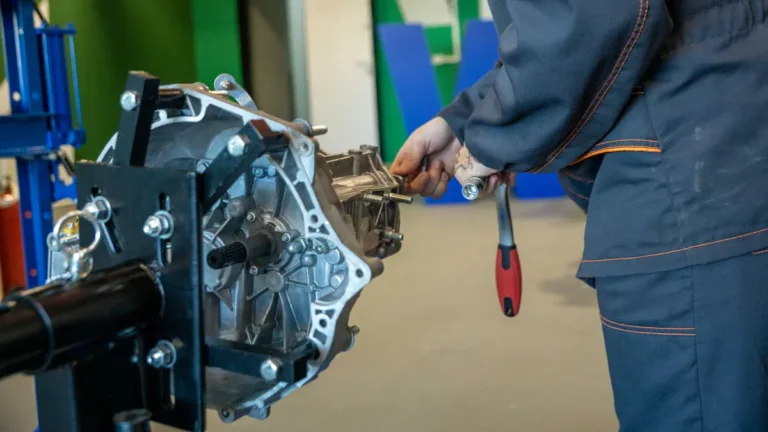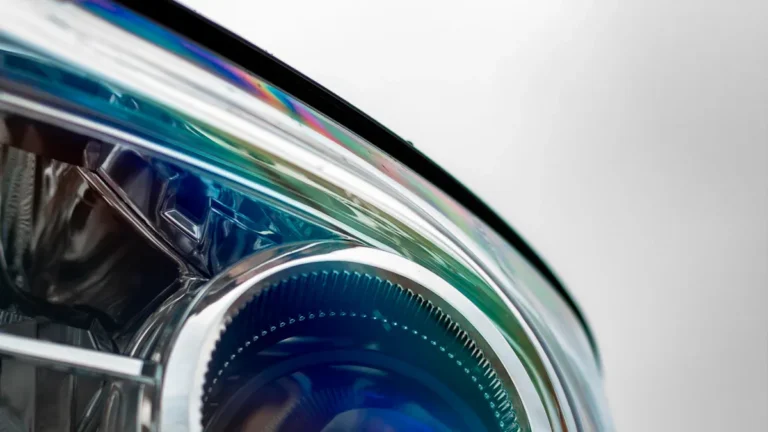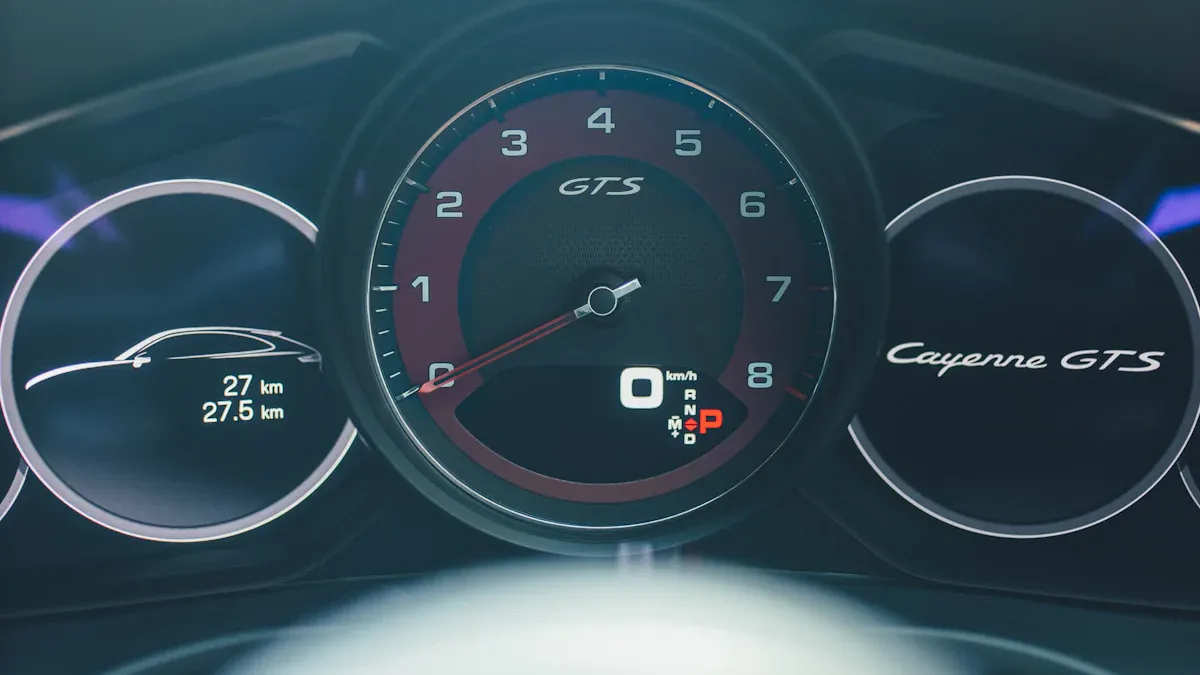
When it comes to fuel efficiency, the Porsche Cayenne offers some impressive options, with the E-Hybrid model standing out as the most efficient. Fuel economy matters, especially in luxury SUVs, as buyers increasingly seek vehicles that balance performance with environmental responsibility. In fact, many luxury SUV shoppers consider fuel efficiency a top priority. Manufacturers are responding by enhancing fuel efficiency and integrating hybrid technologies. This shift not only attracts environmentally conscious consumers but also aligns with modern driving needs.
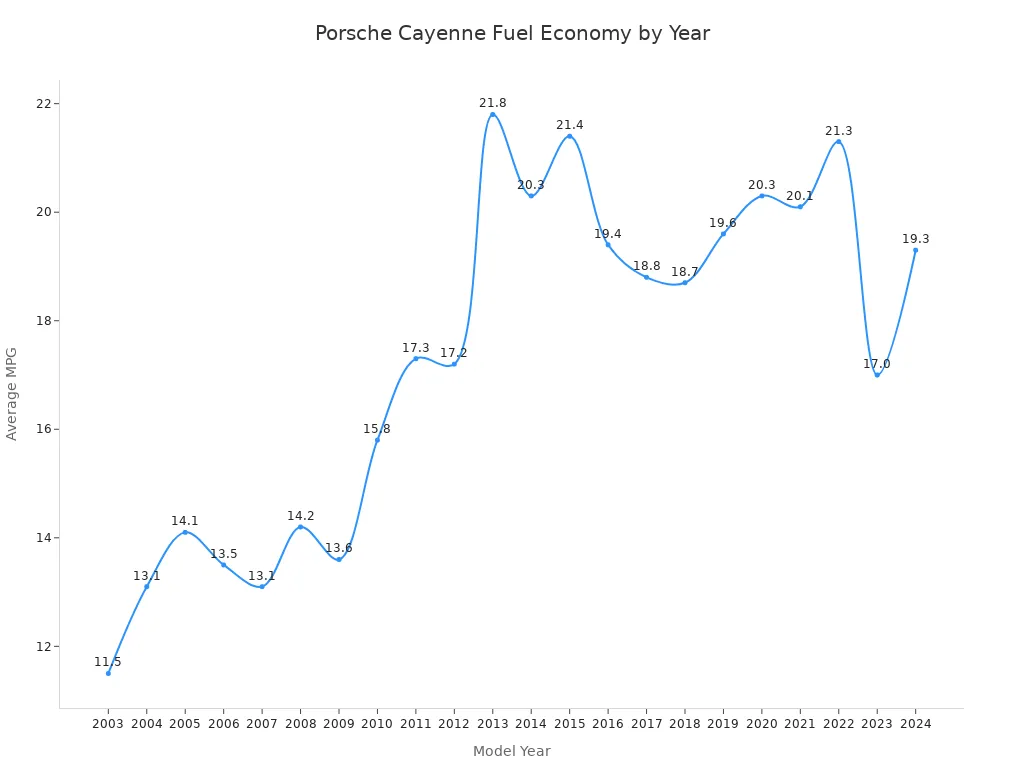
Key Takeaways
The Porsche Cayenne E-Hybrid is the most fuel-efficient model, achieving an impressive 42 MPGe.
Driving conditions greatly affect fuel efficiency; city driving consumes more fuel than highway driving.
Regular maintenance, like oil changes and proper tire pressure, can significantly improve fuel economy.
The Cayenne Diesel offers decent fuel economy but is less efficient than the E-Hybrid.
When comparing luxury SUVs, the Cayenne ranks lower in fuel efficiency than competitors like the Mercedes-Benz GLE.
Porsche Cayenne Fuel Ratings
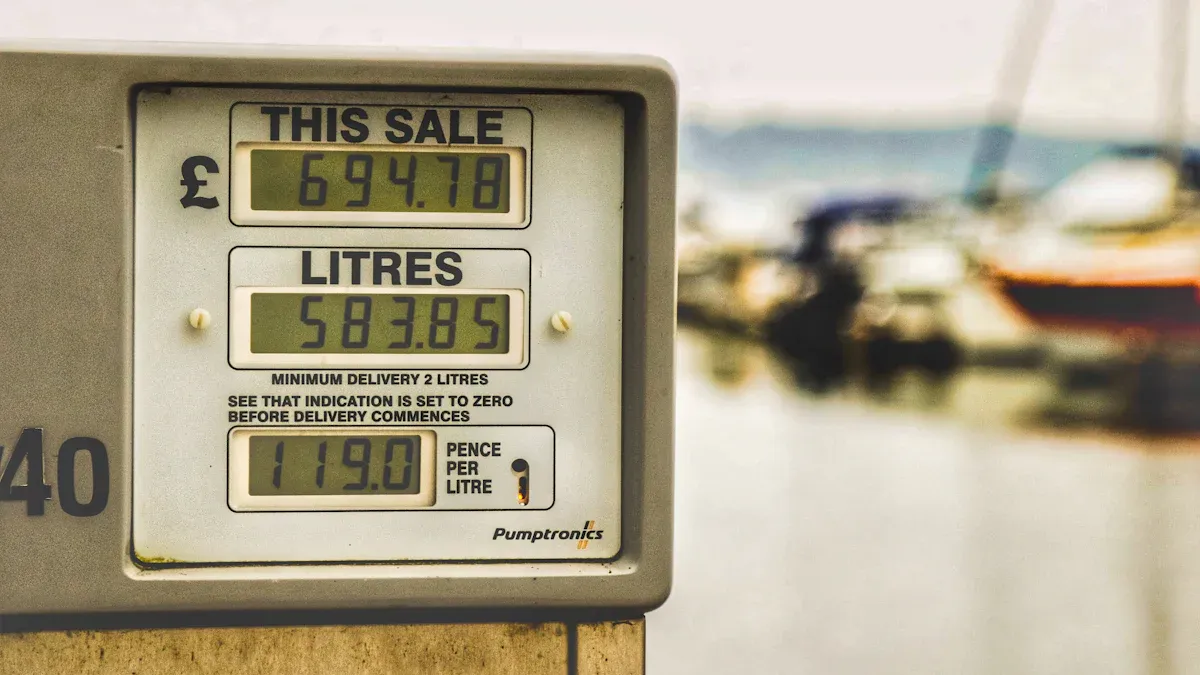
When you look at the fuel ratings for the Porsche Cayenne, you’ll find some impressive figures, especially with the E-Hybrid model. This model is not just about luxury; it also prioritizes efficiency.
E-Hybrid Performance
The 2023 Porsche Cayenne Turbo S e-Hybrid currently holds the title for the highest fuel efficiency rating among the lineup, boasting an impressive 42 MPGe. This model combines electric and gasoline power, allowing you to enjoy a smooth ride while being kind to the environment. Here are some key points about the E-Hybrid’s performance:
The E-Hybrid operates quietly and efficiently in stop-and-go traffic, optimizing fuel use.
It achieves better fuel efficiency than gasoline-only models, especially in electric-only mode.
Heavy use of the gasoline engine can reduce fuel economy to around 20 mpg or less.
On the highway, you can expect to yield over 25 mpg.
Overall, when including electric driving, the average fuel economy can reach just over 42 mpg.
Diesel Options
If you’re considering diesel, the Cayenne Diesel offers solid performance as well. Here’s how it stacks up in terms of fuel efficiency:
Model | City MPG | Highway MPG |
|---|---|---|
Cayenne Diesel | 20 | 29 |
Cayenne Hybrid | 20 | 24 |
While the diesel option provides decent fuel economy, it doesn’t quite match the efficiency of the E-Hybrid. However, it still offers a reliable choice for those who prefer diesel engines.
Factors Affecting Porsche Cayenne Efficiency
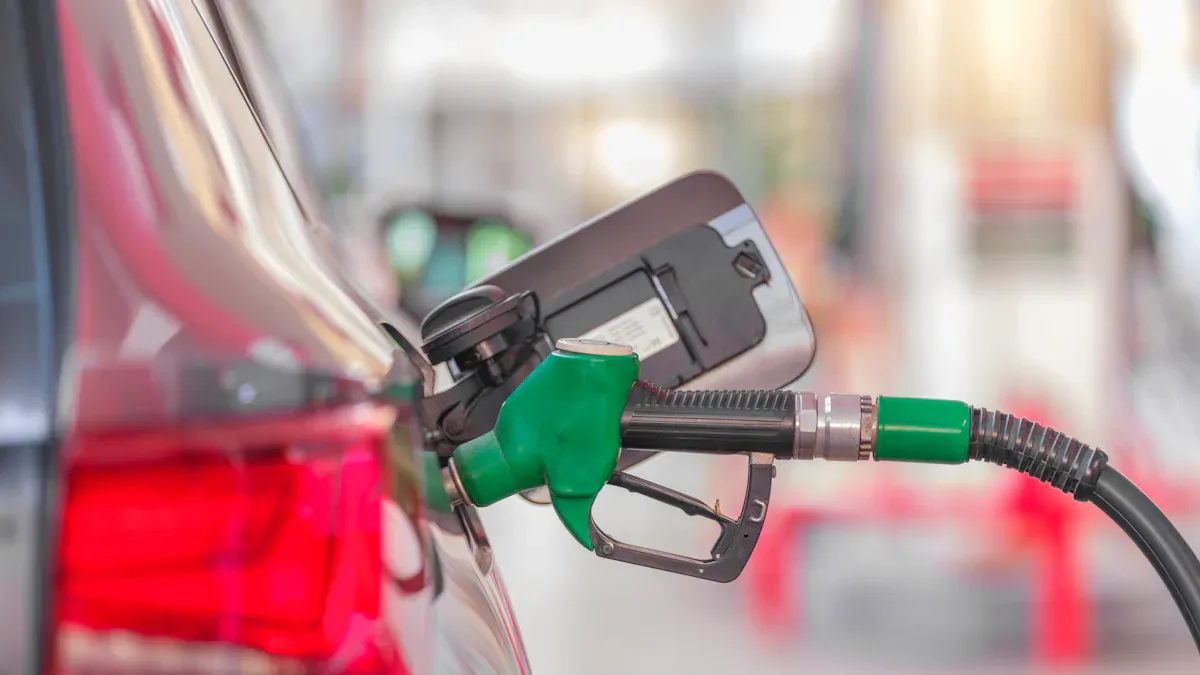
Driving Conditions
Your driving conditions play a significant role in how efficiently your Porsche Cayenne uses fuel. Here are some key factors to consider:
Idling: Did you know that idling consumes more fuel than simply driving to warm up your engine? If you find yourself waiting in your car, it’s better to turn off the engine.
Aerodynamics: When you drive at speeds above 50 mph, aerodynamic drag becomes a major factor. This drag can significantly affect your fuel consumption.
Vehicle Parameters: The weight of your Cayenne, rolling resistance, and aerodynamics can change based on additional equipment and even weather conditions. For example, carrying extra cargo or using roof racks can increase weight and drag, leading to lower fuel efficiency.
To give you a clearer picture, here’s how different driving conditions impact fuel consumption:
Driving Type | Fuel Consumption (mpg) |
|---|---|
City | 10-12 |
Highway | Up to 19 |
City (heavy traffic) | 15-16 |
Highway (cruise control) | 20 |
As you can see, city driving tends to consume more fuel compared to highway driving. So, if you can, opt for longer highway trips to maximize your Cayenne’s efficiency.
Maintenance Tips
Keeping your Porsche Cayenne in top shape is crucial for optimizing fuel efficiency. Here are some maintenance tips to help you get the most out of your vehicle:
Regular Oil Changes: Changing your oil regularly helps maintain engine efficiency. A well-lubricated engine runs smoother and uses less fuel.
Tire Pressure: Check your tire pressure often. Properly inflated tires reduce rolling resistance, which can improve your gas mileage.
Air Filter: Keep your air filter clean. A clogged filter restricts airflow, which can significantly reduce both fuel efficiency and overall engine performance.
Steady Driving: Drive steadily to enhance fuel efficiency. Avoid rapid starts and hard braking, as these habits can waste fuel.
Regular servicing, including oil changes and air filter replacements, enhances engine performance and efficiency. This not only helps with fuel consumption but also prolongs the life of your vehicle.
By following these tips, you can ensure that your Porsche Cayenne remains efficient and performs at its best.
Comparing Porsche Cayenne to Other Models
When you think about luxury SUVs, the Porsche Cayenne and Macan often come to mind. Both models offer a blend of performance and comfort, but how do they compare in terms of fuel efficiency?
Cayenne vs. Macan
Let’s break down the fuel economy of these two popular models:
Model | Fuel Economy (MPG) |
|---|---|
Porsche Macan | 19/25/21 |
Porsche Cayenne | 19/23/20 |
As you can see, the Cayenne and Macan have similar fuel economy ratings. However, the Macan edges out slightly in highway driving. If you prioritize fuel efficiency, the Macan might be the better choice for you.
Now, let’s look at their powertrains:
Model | Fuel Consumption (l/100 km) | CO₂ Emissions (g/km) |
|---|---|---|
Cayenne | 11.7 – 10.7 | 267 – 243 |
Cayenne S | 12.6 – 12.0 | 287 – 272 |
Cayenne E-Hybrid Coupé | 4.4 – 3.9 | 101 – 89 |
Cayenne Turbo E-Hybrid | 5.3 – 4.8 | 120 – 108 |
Macan 4S Electric | N/A | 0 |
The Cayenne offers a range of powertrains, including hybrid options that significantly improve fuel efficiency. If you’re looking for a balance of power and eco-friendliness, the Cayenne E-Hybrid is worth considering.
Competitor Comparisons
How does the Porsche Cayenne stack up against other luxury SUVs? Here’s a quick overview:
The Porsche Cayenne ranks last in fuel efficiency among luxury SUVs like the BMW X5 and Mercedes-Benz GLE.
The Mercedes-Benz GLE is noted as the most efficient SUV in this comparison.
The BMW X5 falls in between the Cayenne and the GLE in terms of fuel efficiency.
If fuel economy is a top priority for you, it might be worth exploring these alternatives. However, if you value performance and luxury, the Cayenne still holds its ground as a top contender in the luxury SUV market.
In summary, the Porsche Cayenne E-Hybrid stands out as the most fuel-efficient model, achieving an impressive 42 MPGe. If you’re focused on fuel economy, the second-generation Cayenne hybrid, with its 21 mpg combined, is also a solid choice. When selecting your model, think about your driving habits and preferences. Whether you prioritize performance or efficiency, the Cayenne lineup offers options that cater to your needs.
FAQ
What is the fuel efficiency of the Porsche Cayenne E-Hybrid?
The Porsche Cayenne E-Hybrid achieves an impressive 42 MPGe. This model combines electric and gasoline power, making it the most fuel-efficient option in the Cayenne lineup.
How does driving style affect fuel efficiency?
Your driving habits significantly impact fuel economy. Smooth acceleration and braking can enhance efficiency, while aggressive driving tends to waste fuel. Aim for steady speeds to maximize your Cayenne’s performance.
Are there any maintenance tips to improve fuel efficiency?
Yes! Regular oil changes, maintaining proper tire pressure, and keeping the air filter clean can boost your Cayenne’s fuel efficiency. These simple steps help your engine run smoothly and consume less fuel.
How does the Cayenne compare to other luxury SUVs?
While the Cayenne offers solid performance, it ranks lower in fuel efficiency compared to competitors like the Mercedes-Benz GLE. If fuel economy is your priority, consider exploring other luxury SUV options.
Can I expect good fuel economy in city driving?
City driving typically consumes more fuel than highway driving. You might see around 10-12 mpg in heavy traffic. For better efficiency, try to plan longer highway trips when possible.

